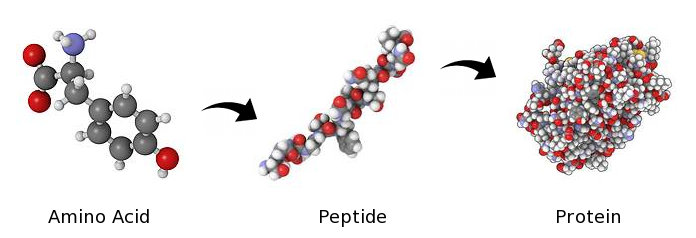Peptides Used in Bodybuilding

If you've been keeping up with new innovations on building muscle then you must have heard about "Peptides" becoming increasingly popular in most bodybuilding/strength circles during the last 5 years. This new "experimentation" in peptides is mostly because of the continued reduction in getting authentic steroids, in Europe and the U.K.
Sports science has known about the significance of peptides when bodybuilding and enhancing sports performance for many years, but it's only in the last 3-4 years they've found out about dipeptides and the tripeptides found in hydrolysed whey proteins. Studies that have been recently done are now able to conclusively show very positive results in sports recovery, as well as bodybuilding performance. Taking a natural peptide supplements is certainly recommended.
Experimental use in peptides is still considered legal, leading Joe bodybuilding public to think it's the next Holy Grail of growing muscle (they aren't). Natural growth hormones (GH), synthetically produced GH, and Insulin are all protein peptide hormones produced by your own body.
Bodybuilders have been using them for 50 years as any peptide is just an amino acid chain (building blocks for proteins), which signal different responses in your body. These amino chains exist in your body, which is why some people consider them "natural" compounds.
Peptides, just like hormones are manufactured by the body continuously. These peptides have now been manufactured artificially very successfully by duplicating some hormones in the body to specifically trigger certain effects that these peptides create when they are released into the bloodstream.
For example, Human Growth Hormone (HGH) is a complete protein hormone consisting of a chain with 191 amino acids. This peptide is actually just a set of numbers describing the 191 amino acids in a very specific order which are then able attach to receptors found at multiple sites all over the body, influencing different muscle cells, bone cells and fats cells.
Legally peptides are classed under "research chemicals", i.e. not intended for any human consumption. All peptides have been classed simply as research chemicals to be used ONLY in lab experiments. But that has not stopped bodybuilders using peptides to maintain their muscle they got from a steroid cycle.
In summary, the definition of a "Peptide" is any chain of 50 amino acids or less plus it needs to end with an amino carboxyl, there are a few exceptions to this rule. All bodybuilding peptides are very closely related to proteins, the difference being the number of amino acids in the chain.
Peptides are eaten in any normal healthy diet, proteins and peptides are basically interchangeable, but one of the exceptions mentioned above is insulin. Insulin works as a peptide as well as a protein. Below is just one example of a very effective peptide to increase GH production.
GHRP-6 (Growth Hormone Releasing Peptide) is known as GH Secratagogue or Hexapeptide. This peptide strongly affects your own (endogenous) HGH production. It is a powerful peptide and been used by the medical profession for years to treat growth hormone deficiency in young adults and children.
Without going into the rather complicated specifics of how these peptides work, it basically signals your pituitary gland to release GH itself, but it also does this by suppressing SOMATOSTATIN too (the antagonist of an effective GHRH or growth hormone releasing hormone).
Below are just a few of the popular peptides used by professional bodybuilders:
1. IGF-1
2. GHRP
3. GHRH
4. Thymosins
5. Melanotropins
There are side-effects from using peptides for bodybuilding like the decrease in your own HGH production, high blood pressure, liver and kidney stress, hadaches, loss of fertility, increased cortisol, etc.
Click Here for Free Anabolic Insider Magazine Subscription
Disclaimer: The information presented is intended to be used for educational purposes only. The statements made have not been evaluated by the Food and Drug Administration (U.S.). These products are not intended to diagnose, treat, cure or prevent any condition or disease. Please consult with your own physician or health care practitioner regarding any suggestions and recommendations made.
 Anabolics Mall
Anabolics Mall